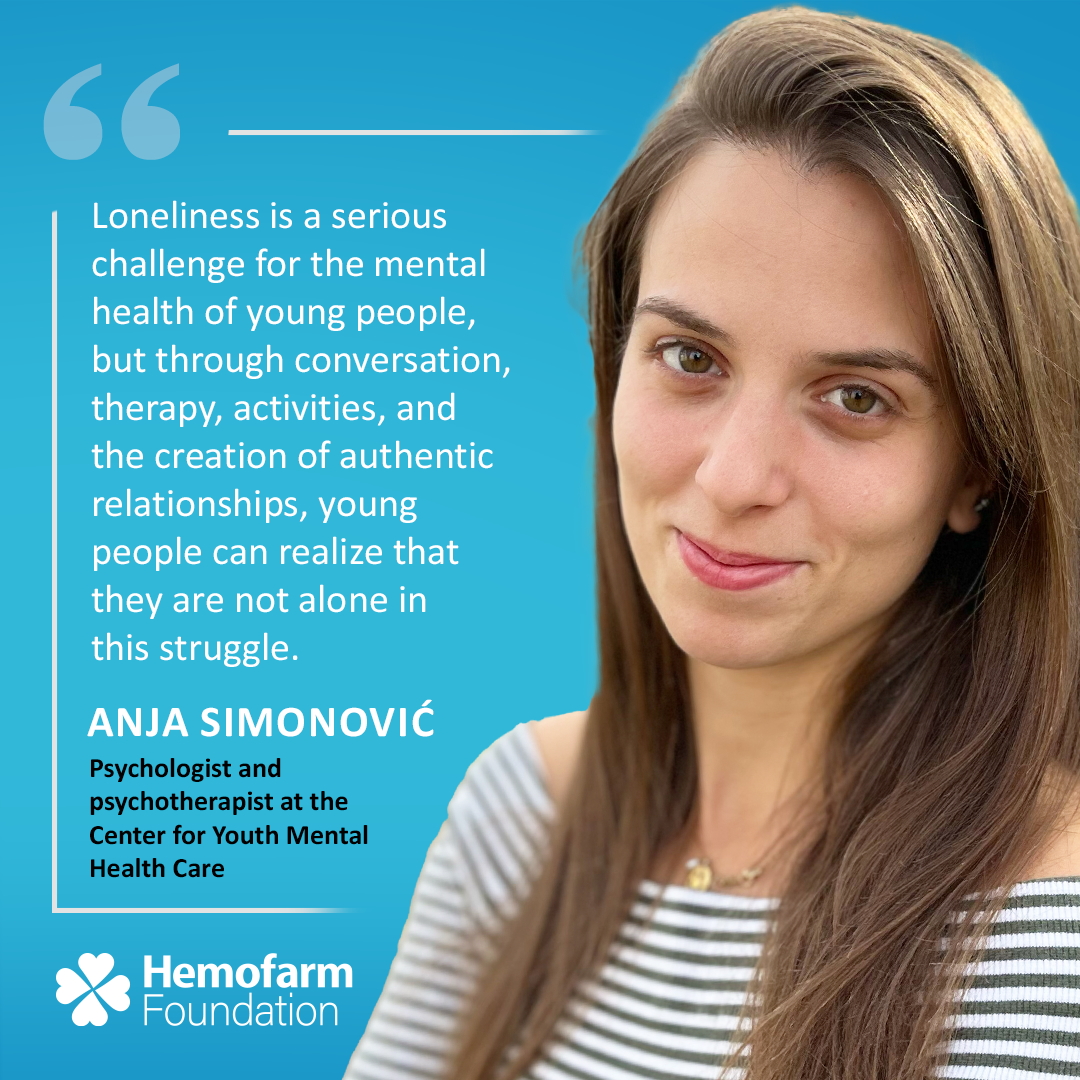
23/10/2024
We Build Bridges Together - Loneliness Among Young People in Serbia
Anja Simonović
psychologist and psychotherapist at the Centre for Youth Mental Health Care (CEZAM)
We Build Bridges Together - Loneliness Among Young People in Serbia
The first association that comes to our mind when talking about loneliness is oftentimes the older population, the segment of society with the highest prevalence of this phenomenon as revealed by previous research. However, this phenomenon has been increasingly studied also within the younger population, and the results of recent studies confirm a growing prevalence of loneliness among young people.
Although many people associate loneliness with physical isolation, it is actually a much more complex phenomenon that encompasses psychological and emotional aspects as well. As a psychotherapist working with young people, I often encounter adolescents who feel lonely, regardless of how physically surrounded they are by other people, that is, no matter how broad their circle of family and friends may be.
There are a number of factors that can enhance the feeling of loneliness among young people in Serbia. Young people often face high expectations and pressures, both from parents and society - to be successful, independent, and emotionally stable. These pressures can create a sense of isolation, especially when young people fail to meet those expected standards. On the other hand, in the world of social media, where attention often focuses on creating an idealized image of oneself, there is pressure to present oneself in the ‘best light’, which can lead to feelings of insecurity and distance from real and authentic relationships. There are also the consequences of the COVID-19 pandemic, which have further complicated this sensitive situation. Shutting down of schools, restricted social interactions, and economic insecurity have impacted the mental health of young people, intensifying their sense of detachment from the community.
Loneliness, as a combination of experience and emotion, can impose serious and long-term consequences on the mental health of a young individual. In my practice at CEZAM, I often see how the feeling of loneliness intertwines with symptoms of depression and anxiety, and is linked to reduced self-confidence and negative self-perceptions, which further and deeper complicates interactions with others.
Apart from emotional consequences, loneliness can also impact physical health. Chronic loneliness implies increased stress levels, which in turn affects immunity, the quality and quantity of sleep, and the health and well-being of adolescents in general.
Recognizing and expressing feelings are the first and crucial steps in dealing with loneliness among young people. It is important to encourage them to openly talk about their emotions and share experiences, as this helps them realize that they are not alone in their experiences and that others go through similar situations too. The family environment, friends, and the school system play an important role in supporting young people during this process.
A recommendation for overcoming loneliness is to engage in group activities, such as hobbies and extracurricular activities, which provide young people with the opportunity to connect with others. Workshops at CEZAM are specially designed by mental health professionals to promote peer interaction and develop skills such as empathy, communication, and emotional intelligence, which help in establishing deeper relationships and prevent feelings of social isolation. Additionally, seeking professional help represents a significant strategy for long-term subsiding of the feelings of loneliness.
At the national level, Serbia could consider, as one of the specific measures, adopting a strategy similar to countries like the United Kingdom and Japan, which have appointed ministers to tackle loneliness. Although at first glance it may seem that such a role may not be viable in our country due to ‘more pressing’ issues, this function would be beneficial for coordinating the healthcare, education, and social welfare sectors in creating policies and programs that reduce the feeling of isolation among future adults and responsible members of society. Moreover, intergenerational projects and initiatives for social connectivity could further contribute to reducing loneliness both among young and older generations.
Finally, increasing the availability of therapeutic and counselling services in schools and universities, along with promoting mental health without stigma, would significantly encourage young people to seek the necessary help.
Loneliness is a serious challenge for the mental health of young people, but through dialogue, therapy, activities, and the cultivation of authentic relationships, young people can realize that they are not alone in this struggle. They can develop resilience to cope with loneliness and successfully master the techniques to address it.

AUTHOR
Anja Simonović
psychologist and psychotherapist at the Centre for Youth Mental Health Care (CEZAM)